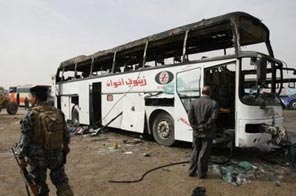Car bomb rocks Iraq shrine city on election eve
BAGHDAD: A powerful car bomb killed three people in an Iraq holy city Saturday on the eve of the war-torn nation's general election which Al-Qaeda has threatened to sabotage by killing people who dared to vote.
The blast near a Shiite shrine in Najaf, which killed two Iranian pilgrims and an Iraqi and wounded at least 54 people, came despite a massive nationwide security operation in the run-up to Sunday's vote.
The bombing occurred about 500 metres from the shrine to Imam Ali, son-in-law of the Prophet Mohammed and one of Shiite Islam's most revered figures, said an official in the city that lies south of Baghdad.
Thirty-three of those injured were Iranian pilgrims, who come in their thousands every month to visit the shrine, a local medic said at the city's Hakim hospital.
The final days of campaigning for the polls, the second parliamentary election since US-led troops ousted dictator Saddam Hussein in 2003, have been overshadowed by a series of suicide bombings in Baghdad and the city of Baquba. Related article: Iraq Sunnis set to vote en masse after 2005 boycott
The Islamic state of Iraq, the Qaeda front here, said in a statement Friday it was imposing a "curfew" on Sunday and anyone who dared defy it would "expose himself to the anger of Allah and... all kinds of weapons of the mujahedeen."
Abu Omar al-Baghdadi, the leader of the Qaeda front, had threatened last month to disrupt by "military means" the poll which looks set to see minority Sunnis vote en masse, in stark contrast to their 2005 election boycott.
The Qaeda statement on Friday came as voting was already under way for an estimated 1.4 million Iraqis living abroad in 16 different countries.
US Secretary of State Hillary Clinton said voting was going well and that Washington would follow through with its plan to halve its troop numbers in Iraq to 50,000 within six months.
Some 200,000 Iraqi police and soldiers will be on duty in Baghdad alone to provide security for the vote, the country's borders and its airports will be shut for the day and all cars banned from the streets.
Iraqi religious leaders used Friday prayers in mosques to order citizens to vote and safeguard democracy in the war-shattered state.
"You must go to the voting centres because it is your duty," said Sheikh Abdulrahman al-Jorani, Sunni imam of the Al-Hai mosque in the central city of Baquba, where 33 people were killed in three suicide attacks on Wednesday. Related article: Iraq's elections: a summary
Ahmed al-Safi, a representative of Grand Ayatollah Ali Husseini al-Sistani, the country's revered top Shiite cleric, said the election was a "huge vital issue," essential to ensuring Iraqis can "draw their own future."
Prime Minister Nuri al-Maliki, the Shiite head of the State of Law Alliance, boasted this week he was "certain" of victory.
But he faces stiff competition from Shiite former premier Iyad Allawi, whose secular Iraqiya list has strong support in Sunni areas.
Also competing for the top job are former deputy premier Ahmed Chalabi, who was once favoured but is now loathed by Washington, Shiite Vice President Adel Abdel Mahdi and Finance Minister Baqer Jaber Solagh.
Iraq's fragmented political scene virtually ensures that no single party will emerge with the 163 seats needed to form a government on its own and the ensuing horse-trading to form a governing coalition is likely to be protracted.
The US military sees Sunday's poll as a crucial precursor to withdrawing its combat troops by September. It says that after that date it hopes to have only 50,000 soldiers here.
Currently there are about 96,000 US troops in the country but they are mostly confined to their bases under the terms of a security agreement that saw them leave Iraq's cities, towns and villages in June last year. Related article: Key dates in Iraq since invasion
Prime Minister Gordon Brown of Britain, which was the chief US ally in the 2003 invasion, came under fire Saturday for the way he defended his role in the Iraq war during an inquiry in London.
Commentators such as Lord Charles Guthrie, the head of Britain's armed forces from 1997 to 2001, said he had slipped off the hook.
Brown had been "economical with the truth" and "disingenuous" in his testimony, he wrote in The Sun tabloid.






